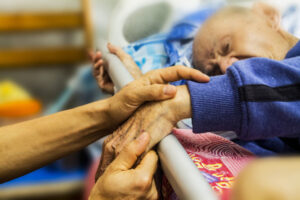 You trust that a nursing home will care for your loved one. After all, that is what you are not only paying them to do, but the entire reason you put them there in the first place. Amid a pandemic, you may wonder if you should remove your loved ones.
You trust that a nursing home will care for your loved one. After all, that is what you are not only paying them to do, but the entire reason you put them there in the first place. Amid a pandemic, you may wonder if you should remove your loved ones.
The news stories about COVID-19 running amok in nursing homes are littering the web, and concerned loved ones fear that if they do not remove a family member, they could lose them in the pandemic. Unfortunately, there is not a universal answer to this question. Instead, it comes down to multiple circumstances.
So, if you find yourself wondering if you should remove a loved one, then you need to consider these unique factors and decide whether removing your loved one is the right choice for you and them alike.
What Should You Consider before Removing a Loved One from a Nursing Home?
There is no one-size-fits-all answer to whether or not you should remove a loved one. Instead, it would be best if you asked yourself the following questions.
What Is Your Underlying Motivation to Remove?
Ask yourself the reasons why you want to remove your loved one. Are you afraid they will contract the illness? Are you worried that they could die from COVID? Or are you worried that you will not have the chance to spend enough time with them?
Emotions are high in a time like this, but you want to make sure the reasons behind your removal are rational.
What Options Do You Have at Your Disposal?
You rely on a nursing home to help your loved one with their care needs; therefore, you need to ask yourself what options you have to provide that care outside of the nursing home. Can you care for them yourself? Will you have other family members ready to help? If you are going to hire in-home care, can you afford that care?
Most importantly, is your home equipped to take on a dependent loved one, such as having room and board, adjustments made for their disabilities or mobility issues, and the space for an extra person living in your home comfortably.
Lastly, ask yourself about your schedule. Are you currently working? If so, will you be in or out of the home? If out of the house, who will watch your loved one while you are at work?
What Care Does Your Loved One Need?
Determine the level of care your loved one needs. Some may need around-the-clock medical care, which could require a registered nurse to provide that care. Your loved one might need help with daily hygiene tasks if they are immobile, such as everything from brushing their teeth to bathing to dressing and even toileting. Can you handle the level of care they need or hire someone to assist so that their care does not suffer?
What Is the Exposure Risk at That Nursing Home?
While there is a high risk of exposure at a nursing home, not all nursing homes are the same. Many nursing homes with outbreaks have failed to use standard disinfectant and contaminant protocols, leading to those deadly outbreaks. Therefore, your loved one’s nursing home might not have the same results.
 What infection control procedures do they have in place? Have they already had an outbreak in that facility? If so, how was it contained, and were further patients infected once infection protocols were put in place?
What infection control procedures do they have in place? Have they already had an outbreak in that facility? If so, how was it contained, and were further patients infected once infection protocols were put in place?
Have there been any deaths at your loved one’s nursing home?
If they are currently living in a nursing home with a high exposure level and out of control outbreak, then you absolutely should remove your loved one. Still, if that facility is taking all necessary precautions and has no history of outbreaks or deaths from COVID, your loved one might be safe staying there.
What Is the Chance of Exposure in Your Home?
You also have to consider the risk with your loved one at home. What is the likelihood someone in your family would contract this illness and possibly give it to a loved one? If you and your current household members are leaving home frequently, such as for work or school, your exposure risk is much higher than if you are still quarantining at home. You want to consider that risk while comparing it to the nursing home’s risk. If the nursing home where your loved one resides has their infection under control, and there is a high risk of exposure in your home, they may not be safer in your home.
That said, you can still social distance in your own home. Plenty of households keep apart, especially from those who are at high risk for exposure.
Help Provide for Yourself and Loved Ones by Updating Your Estate Plan to Prepare for Nursing Home or In-Home Care in the Future
Whether you are already planning for a nursing home stay or you want to prepare for the future, now is the time to update your estate plan and make sure that you are financially ready to pay for nursing home or in-home nursing care.
While you will have options like Medicare and Medicaid in the future, you cannot rely solely on those to cover nursing home care – in fact, there are strict limitations as to how much care they cover.
Furthermore, changes in the latest legislature make it essential that you start planning now for long-term care (in-home or out of the home).
To explore your options, see how you can pay for future care, and protect your loved ones, contact attorney, Andrew M. Lamkin, P.C. He has helped countless clients make their estate plan work for them, including providing for them in the future financially.
You can schedule a no-obligation consultation by contacting our office today, including no-contact consults over video teleconference. For more questions about long-term care or how to start planning ahead, feel free to contact us online.


